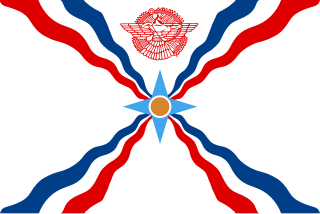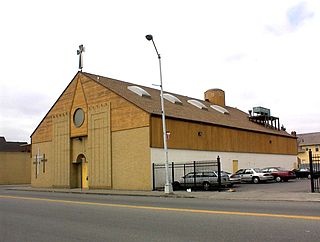
Assyrians are an indigenous ethnic group native to Mesopotamia, a geographical region in West Asia. Modern Assyrians descend from Ancient Mesopotamians such as ancient Assyrians and Babylonians, originating from the ancient indigenous Mesopotamians of Akkad and Sumer, who first developed the civilisation in northern Mesopotamia that would become Assyria in 2600 BCE. Modern Assyrians may culturally self-identify as Syriacs, Chaldeans, or Arameans for religious, geographic, and tribal identification.

The phenomenon of large-scale migration of Christians is the main reason why Christians' share of the population has been declining in many countries. Many Muslim countries have witnessed disproportionately high emigration rates among their Christian minorities for several generations. Today, most Middle Eastern people in the United States are Christians, and the majority of Arabs living outside the Arab World are Arab Christians.

The Assyrian diaspora refers to ethnic Assyrians living in communities outside their ancestral homeland. The Eastern Aramaic-speaking Assyrians claim descent from the ancient Assyrians and are one of the few ancient Semitic ethnicities in the Near East who resisted Arabization, Turkification, Persianization and Islamization during and after the Muslim conquest of Iraq, Iran, Syria and Turkey.

Iraqi Assyrians are an ethnic and linguistic minority group, indigenous to Upper Mesopotamia. Assyrians in Iraq are those Assyrians still residing in the country of Iraq, and those in the Assyrian diaspora who are of Iraqi-Assyrian heritage. They share a common history and ethnic identity, rooted in shared linguistic, cultural and religious traditions, with Assyrians in Iran, Assyrians in Turkey and Assyrians in Syria, as well as with the Assyrian diaspora. Assyrian diaspora in Detroit, Areas with large expat populations include Chicago and Sydney.

Assyrians in Georgia number 3,299, and most arrived in the Southern Caucasus in early 20th century when their ancestors fled present-day Turkey and Iran during the Assyrian genocide.
Assyrian Canadians are Canadians of Assyrian descent or Assyrians who have Canadian citizenship. According to the 2011 Census there were 10,810 Canadians who claimed Assyrian ancestry, an increase compared to the 8,650 in the 2006 Census.
The Assyrians in the Netherlands are Dutch citizens of Assyrian descent and in the Netherlands mostly known as Arameeërs (Arameans/Syriacs) due to their membership to the Syriac Orthodox Church. They mainly live in the east of the country, in the province of Overijssel, in such cities as Enschede, Hengelo, Rijssen, Almelo and Borne. The main reason that the Assyrians are concentrated there is because it is an industrial area which lies at the Germany–Netherlands border, where a large German Assyrian population resides. Many Assyrians in the Netherlands have relatives in Germany.
Assyrian Americans refers to individuals of ethnic Assyrian ancestry born in or residing within the United States of America. Assyrians are an indigenous Middle-Eastern ethnic group native to Mesopotamia in West Asia who descend from their ancient counterparts, directly originating from the ancient indigenous Mesopotamians of Akkad and Sumer who first developed the independent civilisation in northern Mesopotamia that would become Assyria in 2600 BC. Modern Assyrians often culturally self-identify as Syriacs, Chaldeans, or Arameans for religious and tribal identification. The first significant wave of Assyrian immigration to the United States was due to the Sayfo genocide in the Assyrian homeland in 1914–1924.
Iraqi Americans are American citizens of Iraqi descent. As of 2015, the number of Iraqi Americans is around 145,279, according to the United States Census Bureau.

Assyrian Australians, refers to ethnic Assyrians possessing Australian nationality. They are descended from the Northern Mesopotamian region, specifically the Assyrian homeland. Today, their homeland is a part of North Iraq, Southeast Turkey, Northwest Iran and Northeast Syria.

The Christians of Iraq are considered to be one of the oldest continuous Christian communities in the world.

Chaldean Catholics, also known as Chaldeans, Chaldo-Assyrians or Assyro-Chaldeans, are ethnic Assyrian adherents of the Chaldean Catholic Church, which originates from the historic Church of the East.

British Assyrians are British people of Assyrian descent or Assyrians who have British citizenship.

Assyrian nationalism is a movement of the Assyrian people that advocates for independence or autonomy within the regions they inhabit in northern Iraq, northeastern Syria, northwestern Iran, and southeastern Turkey.

Christianity, which originated in the Middle East during the 1st century AD, is a significant minority religion within the region, characterized by the diversity of its beliefs and traditions, compared to Christianity in other parts of the Old World. Christians now make up approximately 5% of the Middle Eastern population, down from 13% in the early 20th century. Cyprus is the only Christian majority country in the Middle East, with Christians forming between 76% and 78% of the country's total population, most of them adhering to Eastern Orthodox Christianity. Lebanon has the second highest proportion of Christians in the Middle East, around 40%, predominantly Maronites. Egypt has the next largest proportion of Christians, at around 10% of its total population. Copts, numbering around 10 million, constitute the single largest Christian community in the Middle East.

Chaldean Town was a historically Chaldo-Assyrian neighborhood in Detroit located along West Seven Mile Road in a segment in between Woodward Avenue to the west and John R St. to the east. Circa 2007 the population of the district was mainly low income elderly people and recent immigrants, who were mostly made up of Chaldean Catholic Assyrians. The neighborhood was usually just a stop point for newly arrived immigrants, who then typically preferred to move to the suburbs of Detroit when they could afford to.

Koy Sanjaq, also called Koye is a town and district in Erbil Governorate in Kurdistan Region, Iraq. In the town, there is a Chaldean Catholic church of Mar Yousif, constructed in 1923.

The Last Assyrians is a 2004 French documentary film by Robert Alaux.

In 2004, Metro Detroit had one of the largest settlements of Middle Eastern people, including Arabs and Chaldo-Assyrians in the United States. As of 2007 about 300,000 people in Southeast Michigan traced their descent from the Middle East. Dearborn's sizeable Arab community consists largely of Lebanese people who immigrated for jobs in the auto industry in the 1920s, and of more recent Yemenis and Iraqis. In 2010 the four Metro Detroit counties had at least 200,000 people of Middle Eastern origin. Bobby Ghosh of TIME said that some estimates gave much larger numbers. From 1990 to 2000 the percentage of people speaking Arabic in the home increased by 106% in Wayne County, 99.5% in Macomb County, and 41% in Oakland County.
















